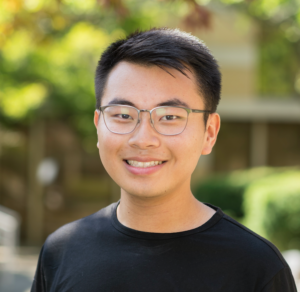
2019-2020 Precious Blood Volunteer, Keven Cheung
by Keven Cheung, Precious Blood Volunteer at KC CARE Health Center
“So, what brings you in today?” is usually the first question I ask patients once I have brought them back to an exam room at KC CARE Health Care Center. Replies will range from a simple follow-up appointment to a long list of health concerns. Patients will reveal personal and intimate details of their lives within a short period of time. Perhaps it is the natural expectation of vulnerability that comes with seeing a healthcare professional or that being strangers makes the information less personal. Whatever the case, people come through the doors seeking help and willingly expose themselves physically and emotionally.
Many of the individuals that come to KC CARE are those that are most vulnerable in our society: uninsured, undocumented, underserved, or homeless. One of the questions I often ponder is how to uphold the dignity of those that I serve. It can be hard at times to balance the desire to sit and talk to patients with the responsibilities I am tasked with. Given the limited time and fixed schedules, upholding a patient’s dignity is often found in small actions. One example of this centers around women’s health. Women who come in for breast and cervical examinations will often be told to undress before the provider comes in so that less time is wasted waiting for the patient to undress. One provider, however, will always go into the room to talk with the patient before allowing them time to undress. After all, sitting there unclothed on the cold examination table with paper thin drapes over your body waiting for the doctor can be uncomfortable for anyone. This seemingly small decision is one way that I see the personalization of dignity in the clinic.
It is understandably hard to work in an environment that addresses suffering. There is only so much that I can do for a patient. Part of my work as a volunteer is to send referrals on behalf of patients to different specialities. Unfortunately, those without insurance are left with the option to either pay out of pocket or to be put on a waitlist for programs that could take up to a year, both of which only negatively exacerbate financial and physical burdens. The best I can offer sometimes feels vastly inadequate to the circumstances patients face. A phone call, fax, or phone number that patients can follow up with is usually only the first step in a long line of hoops they have to jump through. The best part of my day at times is when a patient finally picks up the phone after weeks of trying to contact them. I never expected to learn so much about the healthcare process through referrals.
A few months ago, I remember calling a patient about his referrals. His friend picked up the phone and told me that she and her husband were the ones that took care of and arranged for his health needs. In the few interactions we had, I was encouraged by her consistent responses over the phone and dedication to helping her friend. Many patients do not know how to, are unable to, or do not have someone to advocate for them. Their health issues can often be neglected in comparison to their other responsibilities. With so many fires to put out, no wonder patients miss appointments, phone calls, and medication refills. Working in the clinic has highlighted more problems than solutions, but I also recognize that the most effective way to create change will be a collective one. My hope is that my time in Kansas City will continue to prepare me to critically tackle these challenges as my role within healthcare further develops.
Keven is a current Precious Blood Volunteer serving at KC CARE Health Center in Kansas City, Missouri.
To learn more about becoming a Precious Blood Volunteer go to www.preciousbloodvolunteers.org
This article originally appeared in the March 2020 edition of the New Wine Press.
